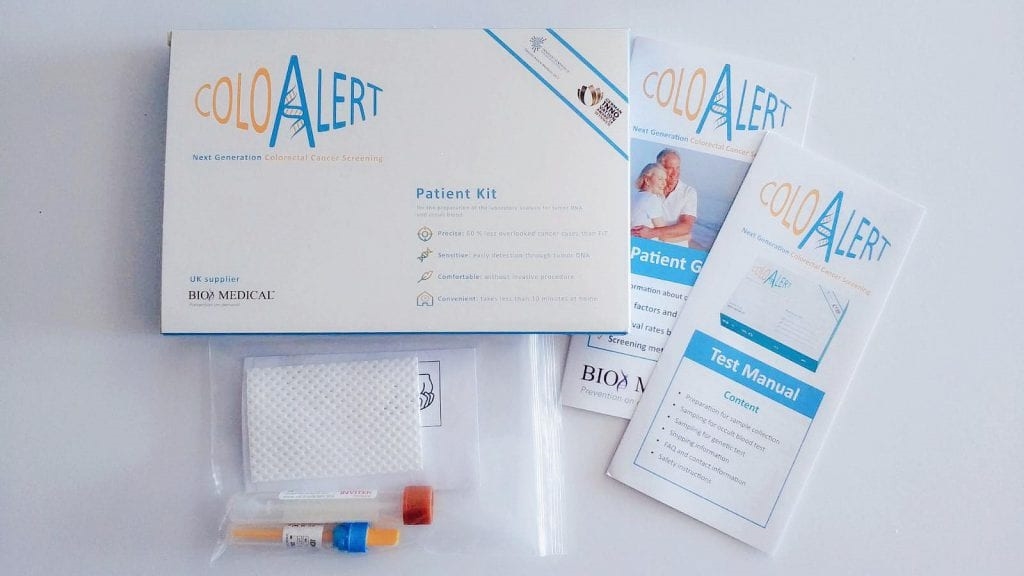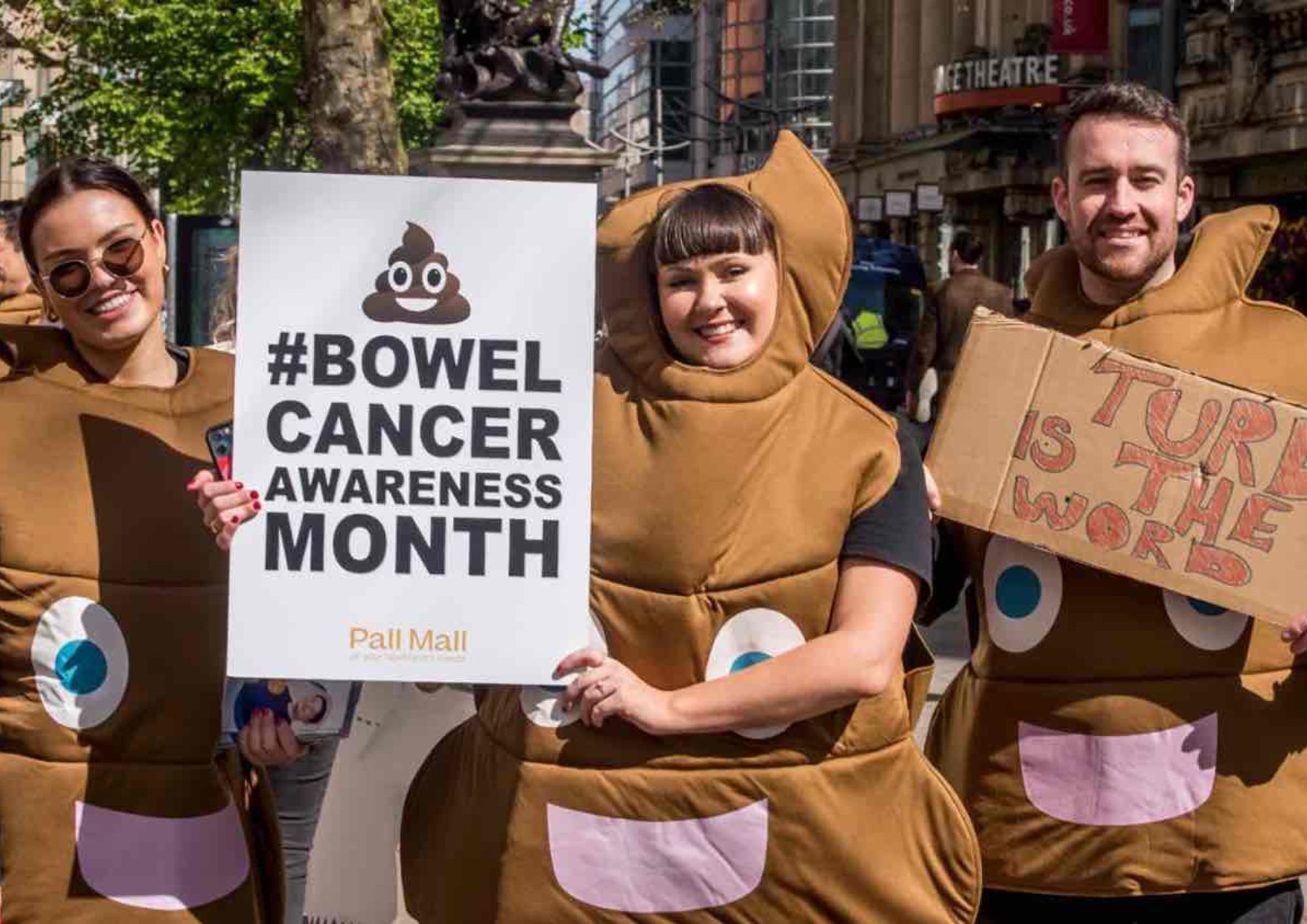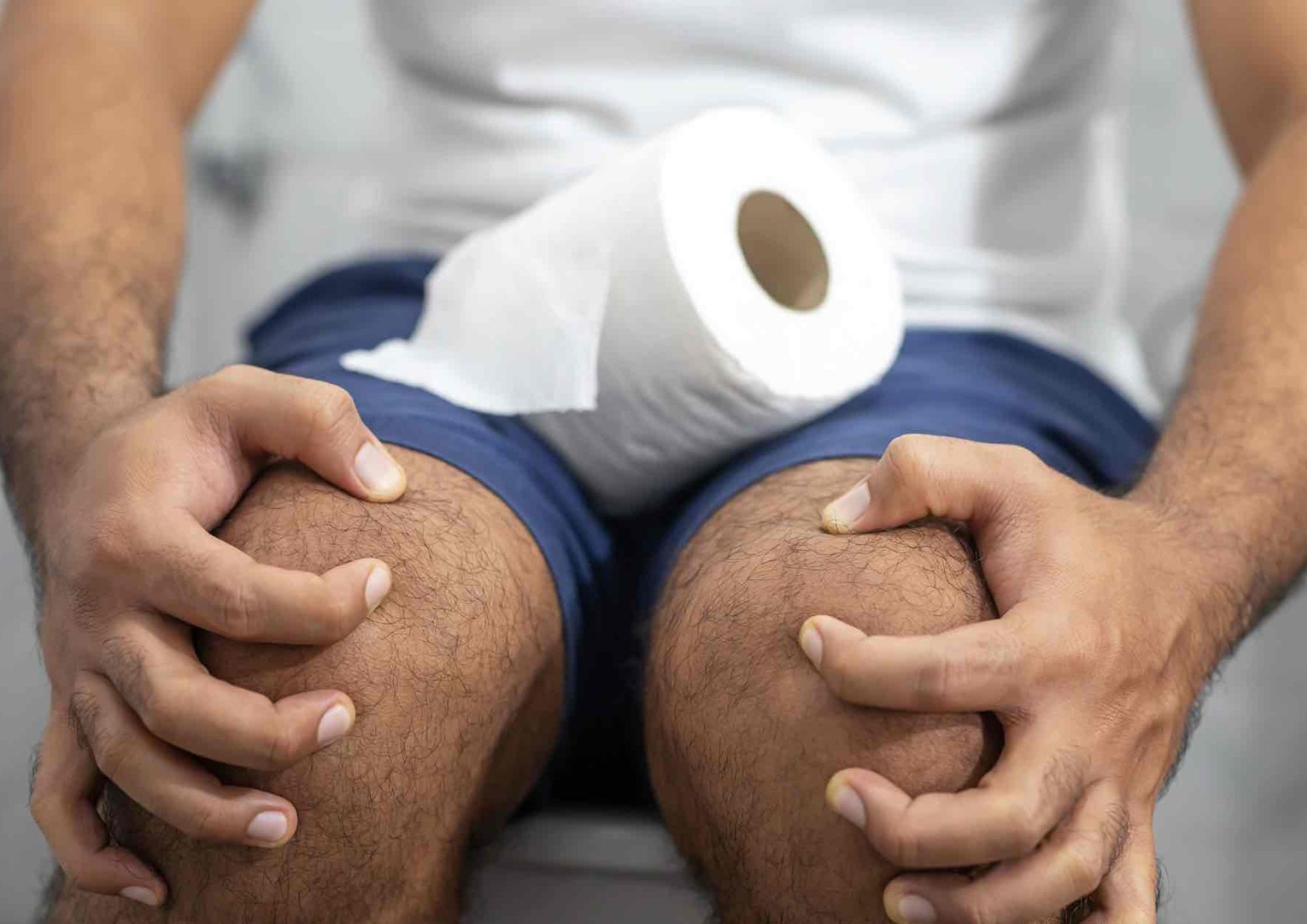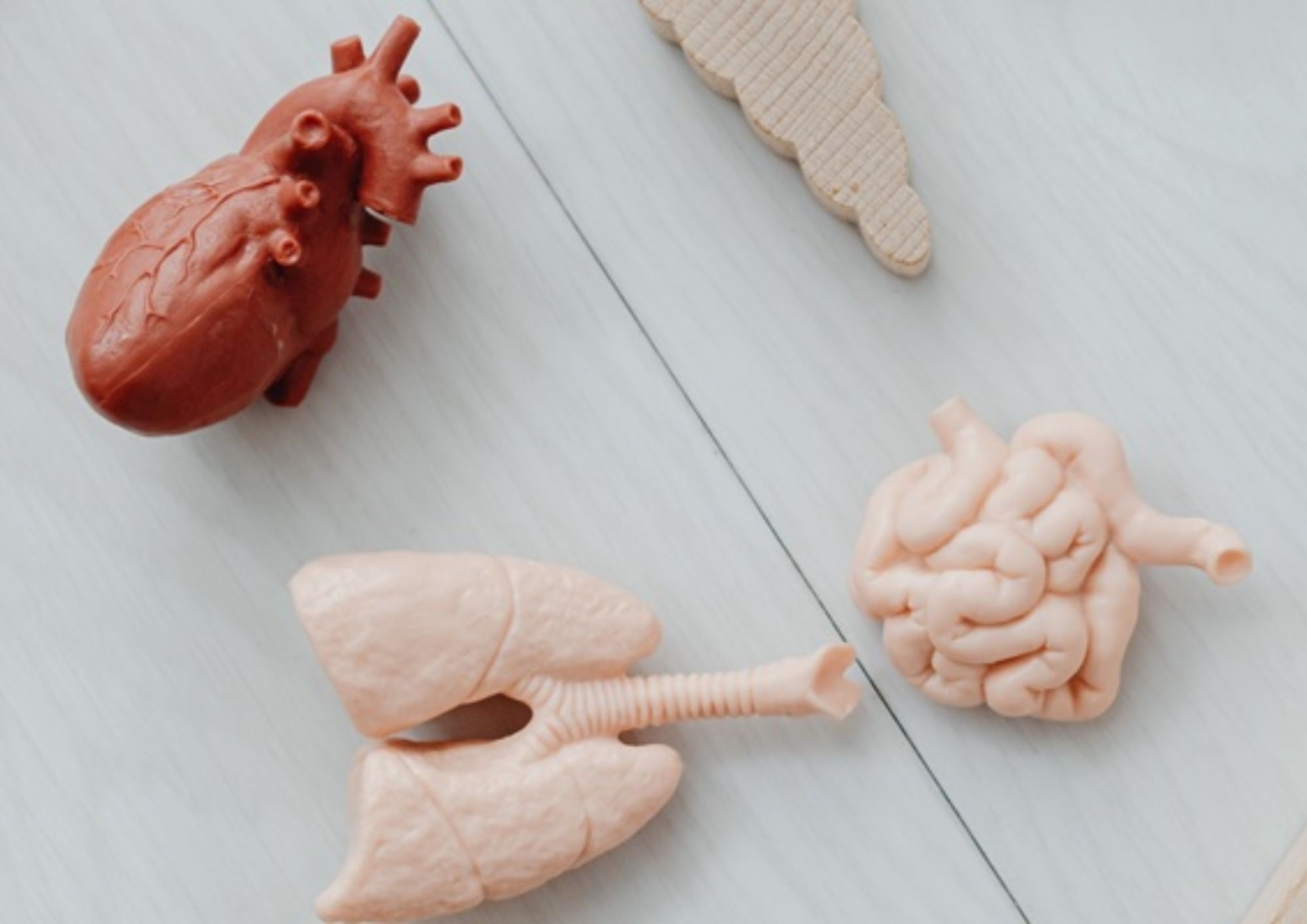ColoAlert® makes Bowel Cancer screening simple, fast, and precise. In the UK you don't qualify for the NHS bowel cancer 'FIT' test until you're 60, but 10% of colorectal cancer cases are diagnosed in the under 50's**, and 73% are diagnosed at later stage ** (under 50's). ColoAlert® is an award-winning next-generation colorectal cancer home screening test developed to detect changes in the bowel earlier and more accurately than the standard 'FIT' test and testing is recommended every three years from the age of 45. The test combines the conventional FIT test with advanced German engineered sDNA technology (stool DNA) to detect blood (FIT test) and mutated DNA (sDNA) for the early detection of Bowel Cancer (Colorectal Cancer) before any symptoms or bleeding may occur. This offers better early detection than fecal occult blood tests alone. Bowel cancer can be cured if detected early. ColoAlert detects 85 % of colorectal cancer cases and often in very early stages of the disease.**** The most common symptoms of colorectal cancer are: a change in bowel habit and frequency diarrhea spasmodic abdominal pain blood in the stool chronic constipation. If you are experiencing any of these symptoms, the ColoAlert test can help to rule out bowel cancer and provide you with peace of mind. *Cancer Research UK (2016) cruk.org/cancerstats **Colorectal Cancer Alliance(USA), Colorectal cancer doesn't care how old you are. https://www.ccalliance.org/about/never-too-young/know-the-facts **** Dollinger MM et al. (2018), ClinLab 64(10), 1719-1730. Gies et al. (2018). Gastroenterology 154(1), 93-104. Cooper GS et al. (2018). Dig Dis Sci. 63(6), 1449-1453.**** Dollin

ColoAlert Colorectal Cancer Screening
- No waiting times
- Fast results
- Convenient clinics
- £398
Dr Tang, GMC registered GP at Pall Mall

The history behind the ColoAlert test
The testing kits were developed in response to rising cases of late diagnosed colorectal cancer (CRC) amongst younger people and because of the personal experience of the kits’ creator Doctor Chun Tang, our amazing GP at Pall Mall, whose father died and brother suffered severe health implications due to the respective late and misdiagnosis of bowel cancer, which is a type of CRC.
A misdiagnosis followed by a late diagnosis severely impacted the health of Dr Tang’s brother aged just 35 and a late diagnosis also led to the untimely death of his father. This deeply personal experience coupled with worrying data around young people stimulated the Dr Tang to develop and launch ColoAlert, as both parties believe it is crucial to diagnose and treat CRC as early as possible so effective care and a better future can be offered to the patient.
Dr Tang said: “I sadly know only too well from my family’s experience how terrible the consequences of late diagnosis can be in colorectal cancers. What’s more, it’s a growing problem for us here in Britain; we have the highest death rates for bowel cancer in all of Europe, a rise in younger people developing bowel cancer due to lifestyle changes and a stretched NHS that doesn’t always have the capacity to identify these cancers in their early stages. But early diagnosis is key to better survival rates and better quality of life post-treatment, which is why I worked to develop ColoAlert. ColoAlert removes this barrier by allowing at-home testing that can either put minds at rest or rapidly increase the course of treatment in order to save lives.”
We have introduced online booking to make things easier for you.

Why should I get screened for Bowel Cancer?
- Bowel cancer is the 4th biggest cancer in the UK with 42,000 new cases per year
- It is the 2nd biggest cause of death in the UK with 16,300 deaths per year
- The uptake of screening is poor, leading to late diagnosis and poor prognosis
- 10% of colorectal cancer cases are diagnosed in the under 50s and 73% are diagnosed at a later stage
- It is recommended that the ColoAlert test is done from the age of 45 every three years
- Men and women aged 60 to 74 who are registered with a GP in England are automatically sent a bowel cancer screening kit (FIT test) every two years

How do I use the ColoAlert test?
STEP 1 - Firstly, line the water at the bottom of your toilet bowl with paper. This is to "catch" your poo before it hits the water.
STEP 2 - Secondly, take the "cocktail stick" supplied with your ColoAlert test pack and collect a small sample of your stool. You only need a very small amount.
STEP 3 - Thirdly, immediately, place it in your "cocktail stick" "test tube", screw it shut tightly, mark it up with your details and that's it. All done and you can get on with your day!
How does ColoAlert work?
What is Colorectal Cancer?
Colorectal (bowel) cancer is a general term for cancers that are located in the areas of the colon (colon cancer) and the rectum (rectal cancer). It is the 4th most common cancer in the UK after breast, prostate and lung cancer and responsible for over 42,000 new cases in the UK per year, of which 56 % were in men and 44 % in women, accounting for 12 % of all new cancer cases.
The table overview shows the mortality for common cancers, broken down by sex.
What are the symptoms of Colorectal cancer?
The most common symptoms of colorectal cancer are:
- change in bowel habit and frequency
- diarrhoea
- spasmodic abdominal pain
- blood in stool
- chronic constipation
However, the symptoms of colorectal cancer are usually very vague, non-specific and can be from different diseases. Furthermore, these symptoms usually appear only in the later stages of the disease and many people with early stage colorectal cancer may not have any symptoms at all. Therefore, it is difficult to diagnose colorectal cancer based on symptoms alone and screening is vital in providing more accurate diagnosis and management.

Enquire About Our Services
A member of our team will be in touch with you to discuss your requirements.
We put you at the heart of everything we do
We put the patient at the heart of everything we do.
Pall Mall Medical is owned and led by doctors –which means care without compromise. We’re driven by how best we can deliver what will make you feel great about yourself – from your first call right through to total, attentive aftercare.
- Care Quality Commission Regulated.
- State-of-the-art facilities.
- No waiting lists.
- Rated 4.95 by our patients.
- No referrals required.
Frequently Asked Questions.
How is Colorectal Cancer treated?
On diagnosis of colorectal cancer the most common treatment options involve:
- 66 % surgical resection for colorectal cancer
- 33 % radiotherapy for rectal cancer
- 31 % chemotherapy for colorectal cancer
- 3 % radiotherapy for colon cancer
What is Colorectal Screening?
The purpose of colorectal cancer screening is to detect and treat the disease as early as possible, since survival rates significantly drop with a later stage diagnosis.
Currently the following screening options are available:
- NHS “Two-week“ urgent GP referral to a specialist for suspected colorectal cancer.
- NHS colorectal cancer screening programme: Bowel Scope (Age: 55-59 yrs – Frequency: One-off) This screening tool is also known as colonoscopy. A physician uses a small camera inserted in the rectum to look for abnormal growth inside the bowel. This is considered the gold standard but invasive, inconvenient and requires dietary and bowel preparations. Currently, this option is subject to limited geographical availability. NHS Faecal Immunochemical test (FIT) for patients aged 60+ yrs – frequency: every 2 years FIT, also often called blood-in-stool test, is a non- invasive screening test that will detect blood from the lower bowel in the stools, which may indicate colorectal cancer. However, blood in the stool may also be caused by other health conditions such as inflammation, ulcers, Inflammatory Bowel Diseases (such as Crohn’s disease or ulcerative colitis) or haemorrhoids. Furthermore, not all colorectal polyps, especially in early stages and right-sided ones, will bleed permanently or at all.
- ColoAlert® stool DNA test for patients aged 45+ yrs – frequency: every 3 years. Currently not available on the NHS, but accessible privately. ColoAlert® is a non-invasive and highly sensitive stool DNA test for the early detection of colorectal cancer. It specifically screens for mutations in bowel cell DNA, that indicate cancer growth rather than an undefined source of blood alone. In addition, the ColoAlert® kit quantifies the amount of human DNA and haemoglobin for a more comprehensive screening profile.
Why screen for Colorectal Cancer?
Colorectal cancer most often results in death if left untreated or diagnosed late. It is the second-largest cause of cancer mortality in the UK with 16,300 deaths per year, accounting for 10 % of all cancer deaths in the UK, which equates to 45 deaths per day (2015-2017).
The Dukes Staging system differentiates between four cancer stages and is based on the degree of spread of colorectal cancer. Each stage corresponds
to a decreasing 5-year-survival-rate:

However, a significant proportion of cases (61 %) diagnosed at stages II, III and IV already report spread of the cancer outside the bowels. In recent years, there has been a dramatic rise in new colorectal cancer cases per year, especially in younger age groups (ages 30: 6.8 % rise/year; under 50s: 1.8 % rise/year).
In England, survival is higher for patients diagnosed aged 15 - 39 and those diagnosed aged 60 - 69, irrespective of stage.
Undertaking colorectal cancer screening is therefore critical for the early detection and prevention, and in turn higher chances of cure and survival.
Screening can be done within the NHS from 55-59 with colonoscopy and from 60 years onwards with FIT tests. However for tumour DNA tests such as ColoAlert®, many experts including the US Food and Drug Administration (FDA) recommend to start from 45 onwards, thus allowing for an earlier detection with increased survival rates.
Who can use ColoAlert?
Anyone who wishes to be screened for colorectal cancer without an invasive procedure can use ColoAlert.
Recommended from the age of 45: Aging can increase the error rate of the replication process of genetic material in cells. This can give rise to mutant DNA, which promotes the development of colorectal cancer. Recent scientific evidence advises for screening to start at the age of 40.
People with the following risk factors:
• High body mass index (BMI)
• Diet high in red/processed meat, fat and/or
sugar
• Smoking
• Alcohol consumption
• Diabetes mellitus Type 2
Exceptions:
Patients with a family history of colorectal cancer should be referred to a geneticist. In the event close family relatives (parents, siblings) have developed colorectal cancer under the age of 50, there is an increased risk of other family members developing the condition deriving from hereditary genes not tested with ColoAlert®.
How long does it take to undertake the test?
The CE-IVD-certified ColoAlert® kit contains everything you need to collect a sample at home in just 5 minutes. The stool samples are processed by our accredited laboratory.
The ColoAlert® patient kit includes stool sample collectors for:
- Stool DNA testing for KRAS/BRAF markers and the quantification of human DNA
- Faecal immunochemical testing (FIT)
How long does ColoAlert take?
1a) See your private GP for an initial consultation about your symptoms. Your GP will inform you about your possible screening options with respect to your symptoms and provide you with the ColoAlert® patient kit to take home.
1b) ColoAlert® patient kits are also available on the ColoAlert® website in our online store. Please consult our website for an up-to-date list of Colo-
Alert® retailers on www.bioxmedical.co.uk
2) Please carefully follow the instructions in the ColoAlert® patient kit provided to you to collect the two required stool samples.
3) Once your samples are collected and appropriately labeled, please follow the provided postal instructions.
4) Important information: the samples need to be sent latest the next day after sample collection in order to arrive at our specified lab within max. 96 hours. Weekend mail is to be avoided due to possible delays in shipping times during non-working days.
5) Laboratory Processing Time: Once your two samples have arrived safely at our specified laboratory, the processing and analysis time for the two samples are 5 days for ColoAlert® Plus and 9 days for ColoAlert® Basic.
Always here to help, whenever you need us
Our expert team are always here to help, advise and arrange appointments with our specialist consultants.












